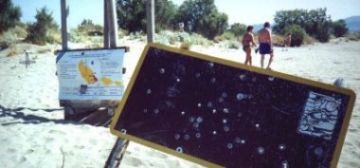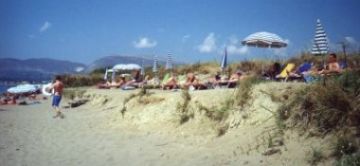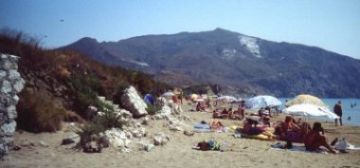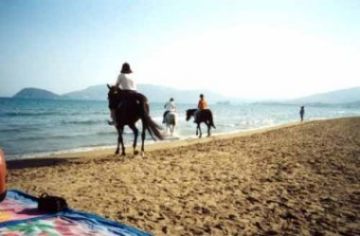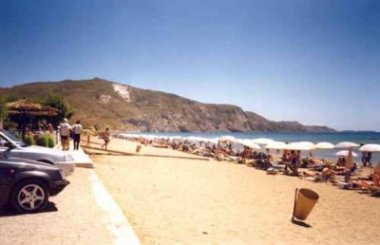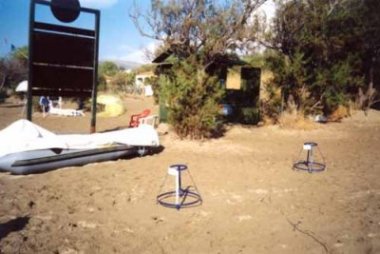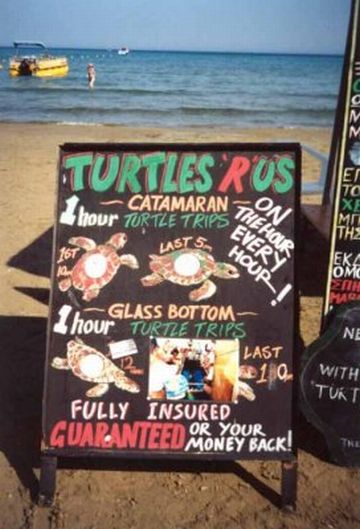Lily Venizelos
Mediterranean Association to Save the Sea Turtles, 1C Licavitou Street, GR-106 72, Athens, Greece.
An outline of a talk given to the BCG Symposium in Bristol on 23rd March 2002.
Sea turtles are remarkable creatures inhabiting the seas and oceans for over 150 million years. Despite intensive research, debates and legal protection measures throughout the world, many populations of the seven species are now endangered. Three sea turtle species are found in the Mediterranean, two of which nest there and once boasted abundant populations: the loggerhead (Caretta caretta) and the green turtle (Chelonia mydas). The leatherback (Dermochelys coriacea) is a rare visitor. Mediterranean sea turtles, which are genetically isolated, suffered from heavy commercial exploitation (estimated to have reached 100,000) until as recently as the late 1960s and are increasingly threatened by nesting habitat degradation due to coastal development that is mainly tourist-oriented. The species most affected by these factors is the green turtle, recently declared critically endangered by the IUCN: only 500 – 1,000 individuals are estimated to nest, mainly in Turkey, Cyprus and according to recent reports, in Lebanon (in preparation). Loggerheads used to nest on many Mediterranean shores, but today only Greece, Turkey, Cyprus and Libya retain sizeable concentrations of nesting females.
Illegal beach front development, unregulated tourism, sand removal and compaction, noise, lights, vehicles, summer beach furniture, and propeller-powered speedboats disturb, disorientate, frighten, injure and deter turtles from nesting. Shading of the sand by beach furniture (towels and umbrellas) lowers the nest temperature and affects the sex ratio of the hatchlings. The Mediterranean, an enclosed sea, rapidly becomes affected by toxic effluents, dumped waste and other factors. Turtles become entangled in discarded nets and ropes, and eat plastic garbage mistaking it for food; they are also affected by contaminants such as oil.
Added to these pressures are incidental catches by fishing activities and exploitation at sea. It could be that incidental catches have been removing more turtles than nest annually on Mediterranean beaches. It is possible that as currently reproductively active adults die off, sea turtle populations in the Mediterranean will suffer rapid decline in the face of steadily decreasing recruitment. This is especially so in the case of the green turtles.
Although sea turtles are classified as threatened species and protection measures exist in most Mediterranean countries, more often than not these laws are blatantly flouted. Inactivity by governments continues, and international Conventions, protective Legislation, conservation Action Plans, EC Directives and Campaigns by NGOs have so far met with little or no success.
Conservation priorities and actions to safeguard the Mediterranean sea turtles should include:
- Further research to assess all remaining potential Mediterranean nesting beaches so that protected areas, such as SPAMIs (Specially Protected Areas of Mediterranean Interest), can be established to limit coastal development. National governments alone cannot carry the full responsibility for the conservation and protection of these areas. Institutional arrangements should help to support them at national, regional and local levels, with the active participation of NGOs and all parties involved.
- Mediterranean wide public awareness programmes for local people (schools, fishermen, tour operators etc), tourists and policy-makers.
- Further investigations of the migratory pattern of turtles, with identification of foraging ground locations, over-wintering areas and other marine habitats. Concomitant investigation into population genetics.
- An immediate end to predation by humans.
- Investigation of the extent to which land and waterborne pollution is affecting the turtle populations.
- Strengthening national legislation to conform to conservation treaty obligations and legislation.
- Co-ordination of conservation efforts, standardisation of data.
Conservation of the Mediterranean marine turtles is an international issue and as such, requires international solutions and international financial support.
The illustrations show how tourism is affecting the nesting beaches of Laganas Bay, on the Greek island of Zakynthos.
© Copyright 2000/2001 MEDASSET, Photographs by Lily Venizelos
Testudo Volume Five Number Four 2002
Top

